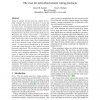Free Online Productivity Tools
i2Speak
i2Symbol
i2OCR
iTex2Img
iWeb2Print
iWeb2Shot
i2Type
iPdf2Split
iPdf2Merge
i2Bopomofo
i2Arabic
i2Style
i2Image
i2PDF
iLatex2Rtf
Sci2ools
109
click to vote
USS
2008
2008
The Case for Networked Remote Voting Precincts
Voting in national elections from the comfort of one's home computer may never be practical or secure, but we argue that remote network voting can be both practical and secure. Provisional and postal absentee ballots, which trade some amount of anonymity for the ability to determine the eligibility of a distant voter, serve as a template for how electronic remote voting might proceed. We propose the "remote voting center": a governmentoperated facility located in embassies, consulates, and other remote areas where voters might normally need to vote by mail. Each remote voting center would maintain one or more electronic voting systems and a registration system. A voter presents identification to the registrar on site and is then directed to cast a ballot in a private electronic voting booth. The cast ballot is encrypted and forwarded to the registration system, where it is wrapped with the voter's identifying information. This double enclosure is signed by the voti...
| Added | 02 Oct 2010 |
| Updated | 02 Oct 2010 |
| Type | Conference |
| Year | 2008 |
| Where | USS |
| Authors | Daniel Sandler, Dan S. Wallach |
Comments (0)

